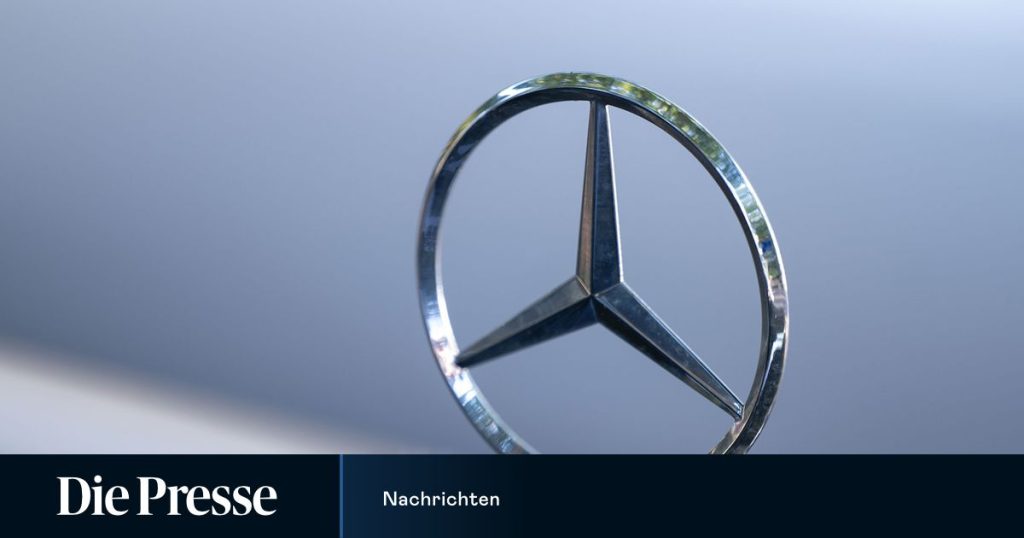German consumer association sues car manufacturer Mercedes-Benz for thousands of customers. A ruling is not expected until next year.
litigation between Mercedes Benz And the German Consumers Association vzbv for damages caused by fraud in diesel exhaust gas will not continue until next year. On Tuesday, an OLG spokeswoman said, at the first hearing of the Stuttgart Higher Regional Court, the judge decided to set the next hearing for January 24. The Senate wants to wait for the rulings of the Federal Court of Justice (BGH) and the European Court of Justice (ECJ).
The Federal Consumer Association (vzbv) accuses the car manufacturer of installing illegal defeat devices in the SUV models GLK and GLC with an OM 651 diesel engine, which on the test bench suggested pollutant values \u200b\u200blower than real traffic. The Federal Motor Vehicle Transportation Authority (KBA) had ordered the models to be recalled three years ago due to disallowed defeat devices. Daimler, then the Mercedes-Benz Parachute Group, executed the summons, but denied the tampering and appealed the KBA’s decision to the Administrative Court. The procedure is still going on.
Is there a right to compensation?
The essence of the test case before the Higher Regional Court in Stuttgart is whether the control of exhaust gas cleaning is an unethical deception, so that a claim for compensation can be justified. According to the Higher Regional Court, it is a matter of setting the filling level online for doses of the agent AdBlue, which must be refilled in diesel cars to reduce nitrogen oxide emissions. The control of the coolant thermostat is also objectionable. It keeps the cooling circuit artificially cooler, delays the heating of the engine oil, thus ensuring compliance with the maximum NOx limit in the legal test cycle. In the case of on-road operation, on the other hand, the function is deactivated and the threshold value is exceeded. “We consider the claims confirmed against our company as part of the diesel customer claims to be unfounded. This also applies to the demonstration procedure of the model,” Mercedes-Benz explained.
Affected consumers were able to register with the Federal Office of Justice’s complaints registry through Monday. According to vzbv, 2,700 Mercedes owners were well registered by June 30. With about 50,000 vehicles affected, consumer advocates expected a clear four-digit number of plaintiffs to join when the lawsuit was filed a year ago. VZBV spokesperson Patrick Langer explained that if the situation is clarified in the proceedings, the plaintiffs will be able to obtain compensation more easily. Then the exact amount must be determined in individual operations.
There is no out-of-court settlement
As with the diesel model’s lawsuit against Volkswagen, consumer advocates have also sought an out-of-court settlement with Daimler. However, the car manufacturer did not agree to this. An OLG spokesperson said Mercedes’ condition could not be compared to Volkswagen’s.
More than 25,000 claims for damages by diesel car owners have already been adjudicated in courts across Germany against Mercedes, which, according to the company, has failed in 95 percent of cases. BGH has also dismissed all lawsuits thus far, on the grounds that while illegal shut-off technology may have existed, there has been no covert action by the vehicle manufacturer to reveal the unethical harm. A case brought by the Ravensburg Regional Court is pending in the European Court of Justice, which aims to clarify the basic requirement for compensation for damages if the car manufacturer acted only negligently. The Advocate General of the European Court of Justice is of the opinion that there is a right to compensation. The court often follows the attorney general’s assessment.
(APA/Reuters)

“Total coffee aficionado. Travel buff. Music ninja. Bacon nerd. Beeraholic.”








More Stories
Wealthy families take more risks when it comes to money.
Salesforce and NVIDIA Form Strategic Collaboration to Drive AI Customer Innovation
Changing banks causes problems for customers